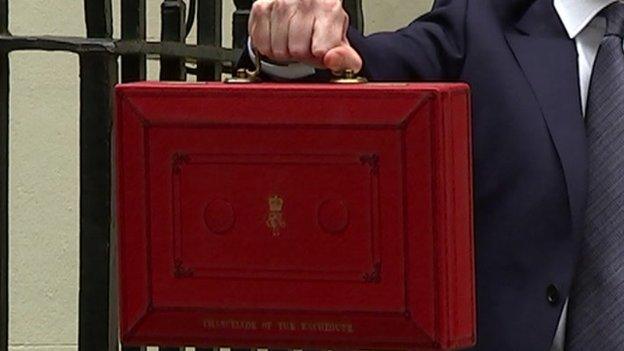Draw up 40% cuts plans, George Osborne tells Whitehall departments
- Published
- comments
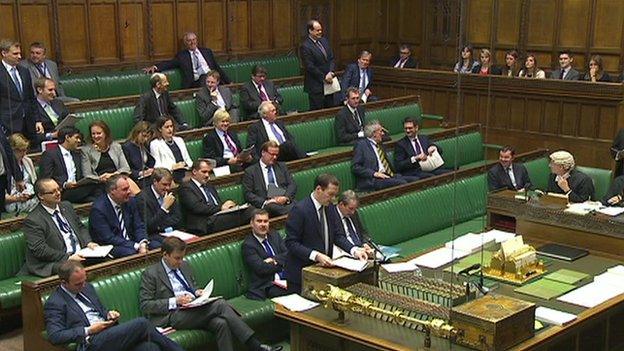
George Osborne has launched his spending review with a call for £20bn cuts to Whitehall budgets.
Each unprotected department has been asked to come up with savings plans of 25% and 40% of their budget.
The chancellor said departments had also been asked to help meet a target of 150,000 new homes on public sector land by 2020.
The NHS and per-pupil schools budgets will be protected in the review, external, which will be published on 25 November.
Mr Osborne, who gave evidence to MPs on Tuesday about the Budget and his spending priorities, said that "with careful management of public money, we can get more for less".
The Treasury said "large savings" would be required of unprotected departments, which have been asked to model two scenarios: of 25% and 40% cuts to their budgets by 2020.
The BBC's economics editor Robert Peston said what was being proposed would require a reinvention of some services taken for granted by the public.
Mr Osborne has already unveiled £12bn of welfare savings plus £5bn of tax avoidance prevention measures - which together with the £20bn of departmental spending cuts make up the £37bn figure earmarked to get government finances back in the black.

Analysis by economics editor Robert Peston
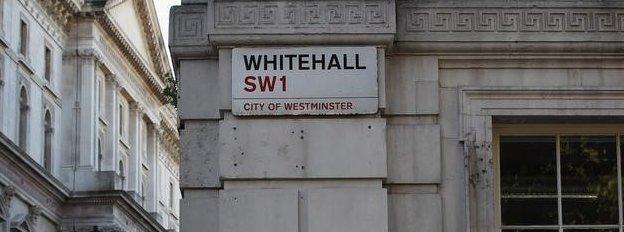
Today I want you to imagine what you would cut from your lifestyle if told that your income would fall by either 25% or 40%, after adjusting for inflation, over the next four years.
It is quite a scary thought, isn't it? Presumably, if you haven't done it already, you'll think about switching the weekly shop to one of those discounters. You will heat up the water for fewer hours. And the kids' swimming lessons will have to go.
But those savings would not even scratch the surface of a 40% cut. To reach that, the kids may have to share a bedroom, so you can take in a paying lodger. And the car would be history.
All of which serves to explain why ministers and officials in all but protected departments and services - that is everything but health, schools, defence and overseas aid - are having panic attacks today.
Because they have been instructed by the chancellor to "model" the impact on the services they provide of finding savings of either 25% or 40% by 2019-20 - or £20bn per annum of cuts in aggregate. This is the stuff of public-service reinvention, not efficiency.

Spending limits will be set for government departments, which will also be asked to examine the way they manage their assets and consider privatisation and contracting out where necessary.
Foreign Secretary Philip Hammond said talk of cuts of as much as 40% were just "a ranging shot".
"Past experience would suggest that initial pitching by the Treasury should be regarded as aspirational," he told MPs on the Foreign Affairs Committee.
"But it is clear that to deliver the overall fiscal trajectory departments collectively will have to make substantial savings, double-digit percentage savings."
'Wider objectives'
The review document, external says it will prioritise spending which: promotes innovation and greater collaboration in public services; promotes growth and productivity including through devolution within England; promotes choice and competition and which drive efficiency and value for money.
Although full details will not be published until November, the document does include some details of specific areas for change.
On local government it says "the government will look at transforming the approach" to its financing and "further decentralising power, in order to maximise efficiency, local economic growth and the integration of public services".
It also sets out plans to sell off publicly owned land that is surplus to requirements, including assets owned by the Ministry of Defence.
The Treasury said the MoD, alone, accounted for 1% of all land in the UK, while the state land holdings were worth £300bn.
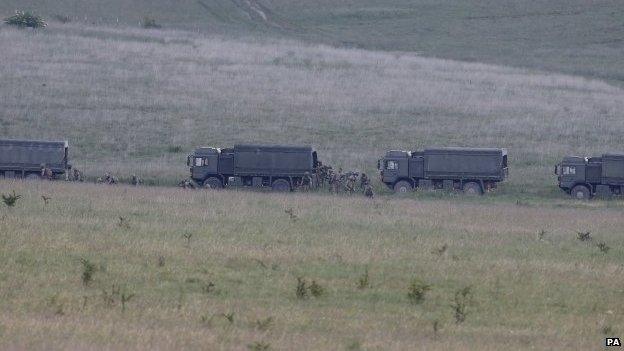
The MoD owns 1% of all land in the UK, the government says
Cabinet Office minister Matthew Hancock told the BBC that £1.5bn of land had been disposed of during the last Parliament and that ministers had only "just started getting going".
"It is clear we can release much, much more," he told BBC Radio 4's World at One. "It also contributes to our wider objectives like housebuilding. The two go hand in hand."
'No more fat'
But the BBC's assistant political editor Norman Smith said the scale of the cuts envisaged meant it would take a lot more than "flogging off a few disused airbases" to meet the chancellor's targets.
For Labour, shadow chancellor Chris Leslie told BBC News: "During the Budget speech the chancellor said that he was going to step off the rollercoaster ride in public spending and now he's asking his cabinet colleagues to perhaps think about deeper cuts than he envisaged only a fortnight ago.
"So it's very unclear what the chancellor's coherent approach is here and I think we do need, of course, those sensible savings but he needs to now come clean and say what exactly is he planning."
The SNP's deputy leader Stewart Hosie said some of the targets set for departments were likely to prove "completely unmanageable" and Mr Osborne risked "setting himself up for a very large fall".
"Perhaps he's setting the bar high and he'll appear to be the good guy if it's less when push comes to shove," he said. "I think the key thing is we look at the last parliament. He failed on all these major targets.
"He seems to be wanting to push the boundaries time after time after time. There's no longer fat to be cut. It's into the bone and the impact on services could be catastrophic."
- Published21 July 2015
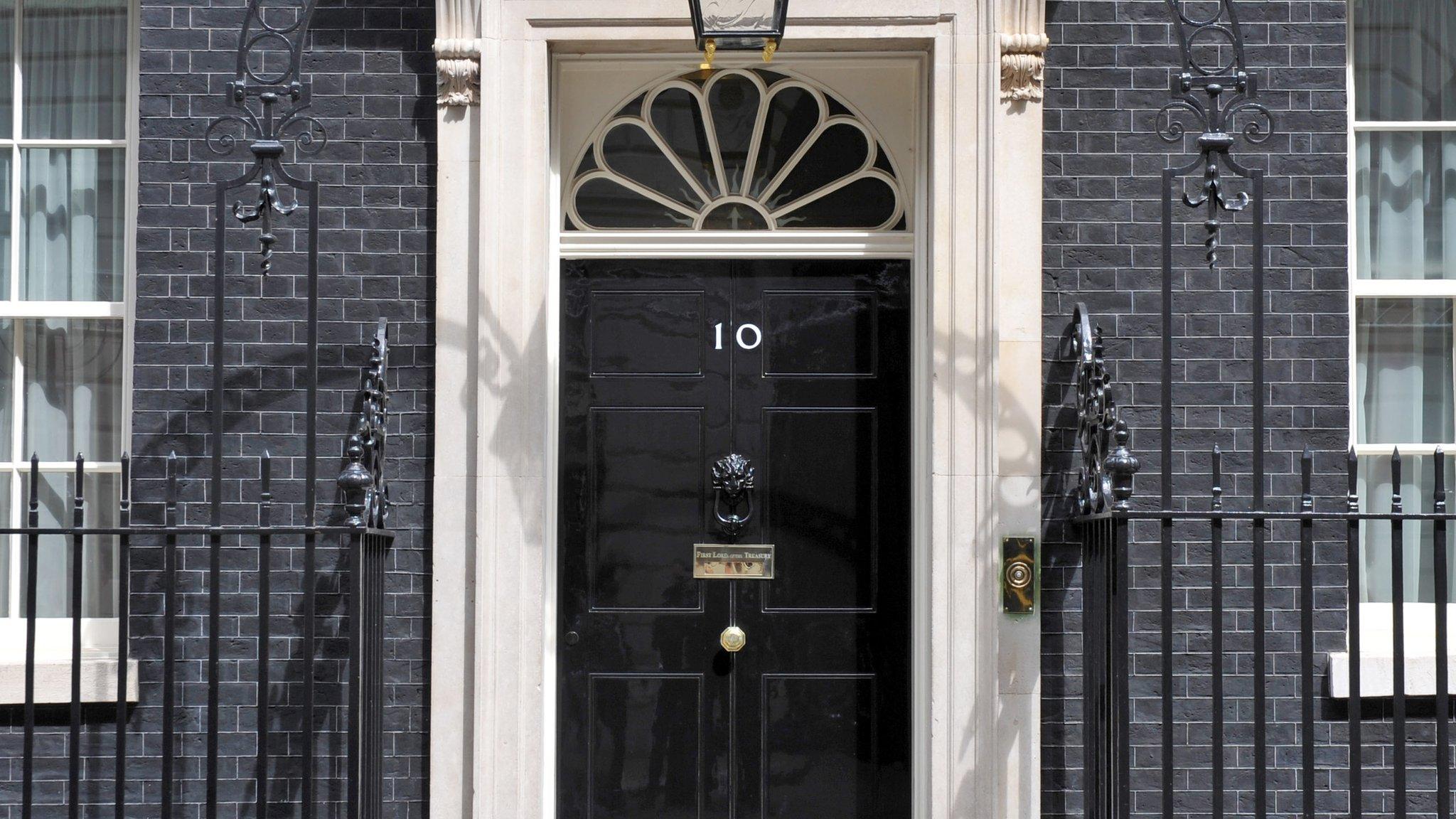
- Published8 July 2015
